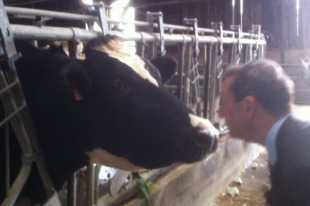I, and a handful of colleagues from BIS and Defra, have recently returned from a short visit to Rennes and Paris, where we had a great opportunity to learn about the relationships between research, innovation and the market in agriculture and food, and the role of public sector and commercial organisations. We wanted to compare and contrast the French system with that in the UK, particularly in the light of our evolving Agri-Tech Industrial Strategy. Earlier in the summer we explored the system in the Netherlands, during a visit to Wageningen and The Hague. There are significant differences of approach in these near neighbours, and it is our intention to use their own understanding and explanation of the benefits and difficulties they face to provide us with a more comprehensive range of ideas for driving increased innovation, efficiency and sustainability in primary agricultural production in the UK.
The French approach is often top-down, with key decision-making and funding framed at a national level. One certainly senses that the State is King! But it’s also very apparent that local structures, and a sense of regional diversity, are very strong. I won’t attempt to describe all these in any detail, but the landscape includes the state-funded National Institute of Agronomic Research (INRA) research organisations, ACTA Technical Institutes, Local Chambers, Regional Agricultural Chambers (APCA), a host of programme-level coordination teams, and many specialised HE institutions for teaching and research. There are numerous public-private partnerships, drawing on and supporting a strong agri-food supply chain; and of course farming and food is culturally and politically a constant in much of French life.
Overall impressions are that this complex system generates an impressive level of innovation. This often appears very focused on the immediate needs of the farming community, or on the demands of the food companies, and there’s no doubt it typically takes place at a very local level – dairy in the west, livestock in central France, arable in the north, and so on. Alongside this, there must then be some level of silo thinking, and huge problems with sharing knowledge, in this “thousand flowers” model, yet at one level it works. At a strategic level, in our conversations with the Agriculture Ministry, there is perhaps a greater recognition that the creation of so many bodies does lead to problems and inefficiencies – and an awareness that “setting up another public body to fix the problem” isn’t always the most efficient. However, the longstanding (and widely accepted) fiscal arrangements – land taxes, production levies, and so on – which are clearly hypothecated to support structures such as the Agricultural Chambers, and to do applied research, provides a sense of stability and certainty for the whole industry.
In terms of public support, there is no doubt that agriculture and food production is seen as a positive career choice by many young people, and there are many incentives to enter it. This is a huge contrast with the UK, with its aging agricultural workforce, and where farming and food are seen as very poor relations in terms of careers. All of this provides serious food for thought: not only for the immediate issues in delivering new partnerships between industry and Government through our Agri-Tech Strategy, but also in thinking about what would, over the long term, optimise the process of translating good basic science into something of commercial value, that allows increases in efficiency and sustainability for UK food production, and that generates significant economic growth through improved trade and inward investment.
In turn, the French were very interested with our strategy, and our attempts to “correct” some of the market failures we have created over several decades, which have led to a loss in competitiveness relative to other major economies. There’s no easy read-across from a system where the role of state-supported intermediate bodies is so obviously critical, to one where we – following the principles of Industrial Strategy – look to the market to drive innovation, but we all gained some valuable insights which we will incorporate where sensible into the future work on the UK Agri-Tech Strategy.
We were very warmly hosted by the Embassy team, as well as several French organisations and individuals. Special thanks must go to Alison McEwen, FCO science attaché in Paris, and our INRA host Bernard Esmein, who devised an excellent and wide-ranging programme over our two day visit.
Stephen Axford, Head of Agri-tech, BIS


Recent Comments